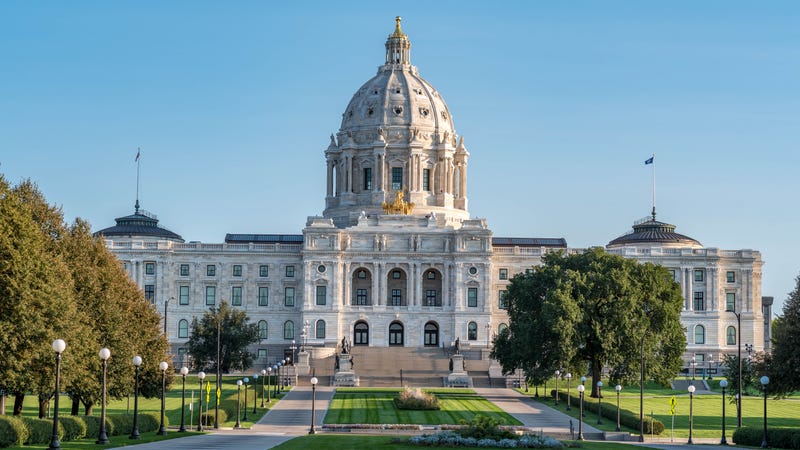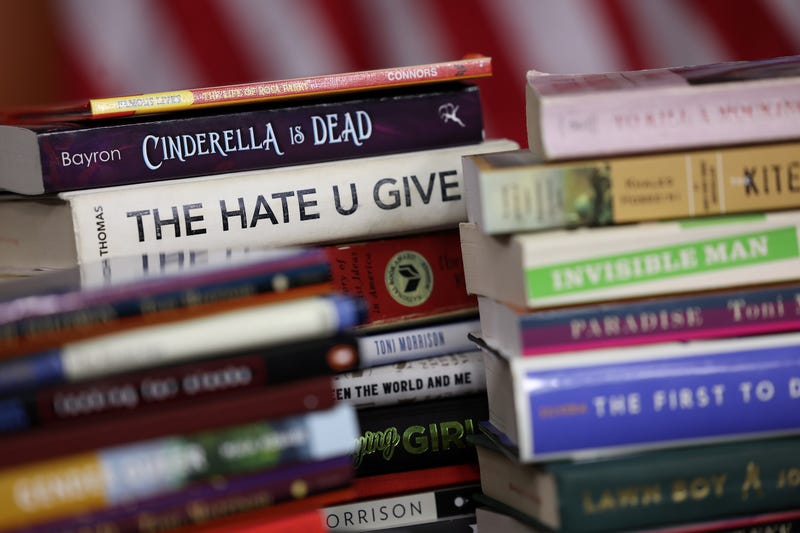From new school safety drills to lawn signs asking residents to vote "YES," there's plenty to consider with the new school year now in full swing. Not to mention a statewide teacher shortage.
WCCO's Laura Oakes takes "A Closer Look" at what's happening across Minnesota schools.
Teaching Spanish - with energy!
"So we all sing this together, repeat it. Ole! No, no, you gotta give it like something like Ole! Repeat that. Ole!"
Most of us would love to have even an ounce of the energy Tommy Murray brings to his Spanish One class a few days into the new school year at Cretin-Derham Hall High School in St. Paul as he leads his students in an "Ole" and the Spanish alphabet.
He's also greeting each and every student in the hallway as they walk into class, offering up a "buenos dias" to the students. Or just speaking their language and offering up their Spanish names.
One thing’s for sure - if students aren’t yet awake when they enter Murray’s classroom, they will be by the time they leave.
In white sneakers and wearing a path up and down the rows of desks, Murray is dialed in to short attention spans, devising his lessons to switch gears about every 10 minutes.
His goal is not for kids to master every letter and phrase of the Spanish language, but to teach them how to learn.
"We all show smart differently and we all acquire knowledge differently," says Murray. "And if I can give students opportunities to show that they're smart and then give them those different opportunities to acquire that knowledge before they show they're smart, they have ownership. And they I think they feel like they got it like, 'oh my God, I feel like I did that myself.' Even though I'm learning with them, helping them learn, there's that. There's that click that I can see in them where they're like, oh yeah, I get it now."
And now with two of his own kids in the building, Murray's heightened awareness following the Annunciation Catholic School shooting is palpable - both as a teacher who never had to worry about this kind of thing, and as a father.
"My daughter's class was sat next to my class during mass. We had mass on Thursday and they're like, 'we're gonna go through with mass, we have a very safe school.' I was fine with that," explained Murray. "But when we were sitting in mass, and this was really hard because I kept looking at my daughter who was 15 feet away from me, and I was like, if someone comes in, like how fast can I get on top of her and make sure she's safe? So that that was different because it wasn't, you know, in the past I was like, I'm gonna, I'll be the first person at that shooter, you know, I'm taking that dude out. Like, that's my thought my whole life. Like, I gotta, I don't know, I just would protect my students for anything. But then last week I was like, I think I'm gonna cover her first, like that's my number one priority and that was - it was irrational. I knew nothing was gonna happen, but it was just everything that had gone down, and I think being at that mass, and it was the next day, it was just, it was hard not to be irrational about it. Just because it was so awesome, I was like, that's my kid right there."
That passion for finding what lights the lightbulb started when Murray himself was a student at Cretin-Derham Hall in the late-1990’s. His own learning challenges fostering genuine empathy and passion, and coloring everything he does as a teacher.
"Even in the lowest level, Spanish students have a lot of expectation on themselves and one thing I try not to forget is how does the student feel when they feel dumb, or how does the student feel when they don't understand," Murray adds. "I want to know those feelings and keep those because if I see that in a student or understand that maybe they're struggling, how can I support them?"

Funding continues to challenge school districts
It’s comforting to know teachers with Murray’s level of commitment and investment in students are out there in all of our schools. But there's no denying the profession is more complicated and layered than ever these days.
Declines in enrollment due to things like a falling national birthrate and a growing school choice movement are leading many districts around the country to weigh whether they should close schools.
That, in turn, can put pressure on school budgets that are largely driven by head count. In Minnesota, voters will have no shortage of school levy and referendum questions to consider at the polls this fall, with funding challenges the norm rather than the exception these days.
Superintendent of Minnetonka Public Schools and President of the National School Superintendents Association David Law says it's a much different picture than the pre-Baby Boomer retirement wave, when the biggest chunk of the state budget went toward public education.
Now, Law says it goes to Health and Human Services and retirement.
"So, I think the numbers, this is not an exact quote, but I think at one point in time when the state's budget was $30 billion, it was $20 billion education, $10 billion other stuff," explains Law. "Now it's $70 billion and it's$ 45 billion other stuff, $25 billion education or something like that. The amount in education has doubled, the other has tripled. And so I remind people, like our number of students as a state has crept up, but our share of the state budget has dropped. Now, we're getting more money per student, but if you look at, if you were to think of it this way, I'm an old math teacher, OK? If you say, if we got that same percentage of the state budget for kids that we got in 2000, it would be significantly different than what we're currently getting. Not even looking at inflation, if we just got the same portion of the state investment, we wouldn't be asking for money and good Lord, we'd be able to uniquely meet the needs of every student incredibly."
Another big factor impacting school budgets? Technology.
"hen I started, my district didn't have a technology budget. We didn't fund computers but I remember getting classroom phones," recalls Law. "That was, they used to have a PA you could call the office and an announcement came to your whole class, 'send Laura down.' Now they call your cellphone. Now they email you. So our parents, if you could no longer communicate with teachers with technology, they would go crazy. But that requires a constant budget to support applications, infrastructure, technology. Constantly improving. Then on top of that, there are all these applications that make life great through communications, pushing messages out, posting on a web page, and we didn't have a district web page when I started. Platform, cybersecurity, so we have this big part of our budget that just didn't exist before."
But even in relatively financially-healthy districts, there is a universal problem impacting schools statewide, and that’s a persistent teacher shortage.
Law attributes much of that to the COVID-19 pandemic, a negative narrative surrounding education, and even the behavior of some parents.
"When we put the classroom in people's homes, you know, I have shared this anecdotally. I was a superintendent through the pandemic in Anoka-Hennepin," says Law. "The first time kids logged on and parents - who really hadn't paid attention to what was happening in the kids' classroom - heard the teachers talking about whatever topic, and when your house only watches one news channel or another news channel, and the teacher's talking about the other one, parents are like, 'whoa, whoa, whoa, we don't watch that news.' I mean, and so all of a sudden parents leaned in and said, 'hey, I don't think you're giving a balanced education in your classroom,' and for some teachers, that's the first time they ever received that kind of criticism. And there was kind of a walking back. Like, I don't need this stress in my life. There was, you know, our society has lost some civility over time and our teachers feel it. People have no problem just completely unloading on a teache. Teachers haven't ever loved to give parents bad news because parents love their kids more than they love the teacher. But now, when there's no filter coming back the other way, it's even harder. So I think that plays a part in it. I think the cuts, the narrative that our schools are failing nonstop. It's still an incredibly rewarding job, but it comes with this pretty consistent, 'this is a failing system, you're not meeting expectations.' So if you're not experiencing the connection and success and support from parents, it's hard."

The "Freedom to Learn"
Monica Byron sees that firsthand as President of Education Minnesota, the state’s largest teachers union.
In fact, the union has gone so far as to implement a 'Freedom to Learn' policy, stressing educator's ability to teach an honest history of the nation and choose resources that are developmentally appropriate for their students, without outside groups trying to impose their political views on the classroom.
"You know, some of these outside groups like Minnesota Parent Alliance or Moms for Liberty that have passed the messages on that there are nefarious things going on in our schools, and unfortunately instead of coming into our schools and seeing the great things happening, people have believed some of the things and not done that investigating for themselves," says Byron. "And so, they've elected school board members that have then passed on these policies for book bans, for curriculum that won't, you know, teach about slavery or indigenous histories. So, unfortunately, when school board elections and other things that have those agendas, they impact our classrooms."
On top of those challenges, Byron says the role of today's educator goes well beyond the classroom walls.
"When we see security threats, we see our teachers at the front lines to make sure that our students are safe," Byron explains. "So they have to sometimes be security guards or when our students are having a hard time, that first adult that they see is usually their teacher or that education support professional. So on top of being that person that is there to ensure that they are learning, they are that person that has to be that therapist. Or has to be that counselor on top of the other things that they need to do to ensure that the standards and all the other things that are, you know, that they're required to do are met."
As for the teacher shortage, Byron is excited about a new apprenticeship program to help school paraprofessionals become fully-licensed teachers, without the college debt that can often go along with it.
The goal? To eliminate that understaffing plaguing so many districts, and fill the pipeline with more of those Mr. Murrays.
